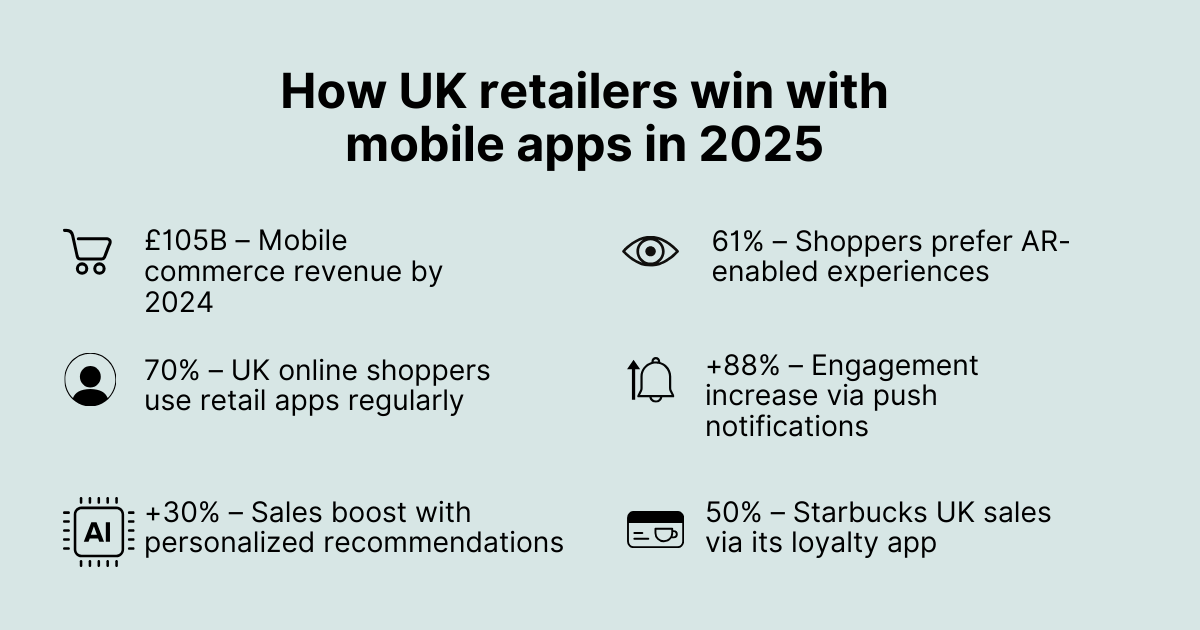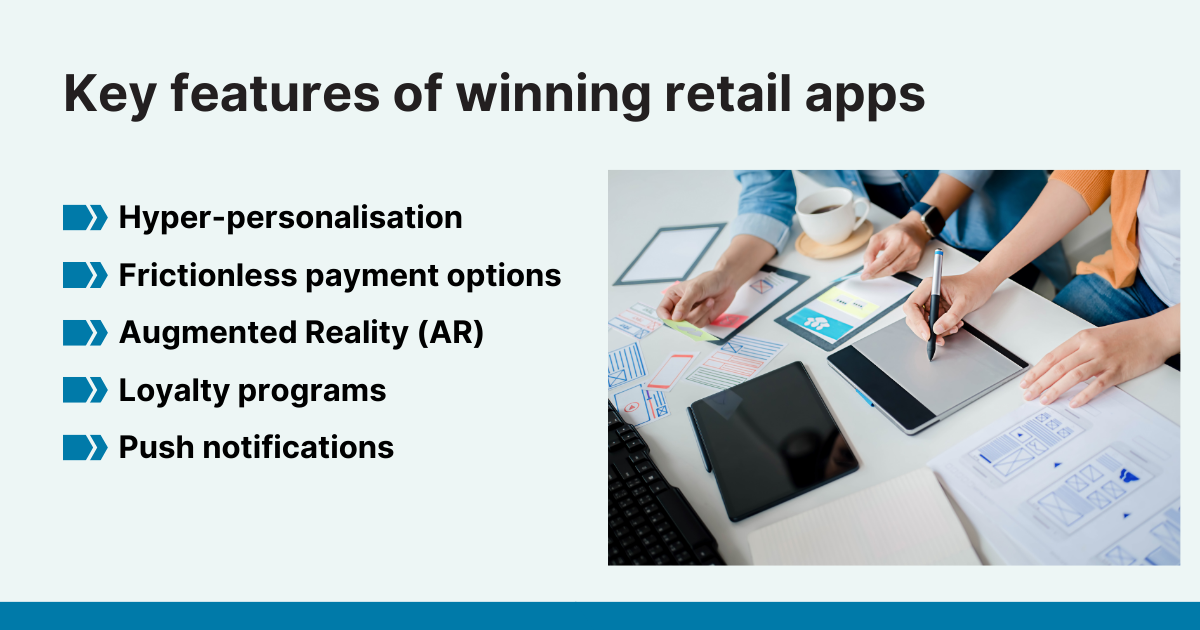How UK retailers are winning with custom mobile apps in 2025

The retail industry in the UK is in the midst of a digital revolution, and mobile apps are leading the charge. Consumers today expect convenience, personalisation, and seamless experiences – demands that custom mobile apps are uniquely equipped to meet. By 2025, the retailers thriving in this competitive landscape will have embraced mobile technology to redefine how they connect with customers and streamline operations. Custom mobile apps in 2025 are going to set new standards in the retail industry. By leveraging innovative mobile technologies, they are enhancing customer experiences and driving significant growth.
But what makes mobile apps such a game-changer? And how are UK retailers leveraging them to stay ahead? Let’s explore.
Why mobile apps are critical for retail success
The mobile-first revolution
The shift towards mobile-first experiences is undeniable. By 2024, mobile commerce (m-commerce) is projected to contribute over £105 billion in revenue in the UK, accounting for 55% of all e-commerce sales. Shoppers increasingly prefer apps over websites for their ease of use, speed, and exclusive benefits.
Research from Statista reveals that 70% of UK online shoppers use retail apps regularly, highlighting the growing reliance on mobile technology. For businesses, this represents both an opportunity and a challenge—failing to meet these expectations risks losing customers to competitors with better digital offerings.
A path to loyalty and revenue growth
Mobile apps offer more than just convenience; they foster deeper customer loyalty. Features like personalised recommendations, loyalty programs, and push notifications to keep users engaged. According to McKinsey, brands that personalise their digital interactions see a 10-15% increase in revenue and a 25% boost in customer satisfaction.
1. Hyper-personalisation
Imagine logging into an app where every product recommendation, discount, and notification feels designed specifically for you. That’s the magic of hyper-personalisation. Apps equipped with AI analyse user behaviour, past purchases, and browsing history to deliver experiences tailored to individual preferences.
- Example: ASOS leverages AI to predict fashion trends and recommend styles, driving a 25% increase in customer retention.
- Stat: Personalised recommendations can boost sales by up to 30%. (McKinsey)
2. Frictionless payment options
The checkout process is often the make-or-break moment in e-commerce. Apps that offer one-click payments, wallet integrations (like Apple Pay or Google Pay), and buy-now-pay-later services dramatically reduce cart abandonment rates.
- Fact: Retailers integrating Klarna saw a 45% increase in average order value, proving that convenient payment options drive spending.
3. Augmented Reality (AR)
AR is changing the way customers interact with products. Retailers like IKEA have set the standard with features that let users visualise how furniture will look in their homes, making purchasing decisions easier.
- Stat: 61% of shoppers are more likely to buy if they can experience products through AR. (Think with Google)
4. Loyalty programs
Integrated loyalty programs are a powerful way to keep customers engaged. Apps that make it easy to track rewards, redeem points, and access exclusive deals create an ongoing relationship with users.
- Example: Starbucks reports that 50% of its UK sales come from its loyalty app, which incentivises repeat purchases and builds brand affinity.
5. Push notifications
Done right, push notifications are a direct line to your customers. They keep users informed about sales, restocks, or personalised deals—driving traffic back to the app.
- Stat: Push notifications can increase app engagement by 88%, but relevance is key to avoid overwhelming users. (Business of Apps)
How mobile apps drive customer engagement
1. Gamification: Turning shopping into an experience
Gamification taps into users’ competitive nature, making shopping fun and engaging. Features like daily challenges, points systems, or spin-to-win games encourage users to spend more time in the app.
- Example: Nike’s SNKRS app keeps sneakerheads hooked with limited-edition drops and interactive games, creating a loyal fanbase.
2. Social sharing: amplifying reach
The brand generates organic buzz when users share their purchases, wishlists, or reviews on social media. Social sharing features turn customers into ambassadors, expanding the brand’s reach without additional marketing costs.
- Example: Depop’s app thrives on community-driven sales, with users actively promoting items across platforms like Instagram.
Streamlining operations with mobile apps
1. Real-time inventory management
Apps with real-time inventory syncing ensure customers always see accurate stock levels, reducing frustration and increasing trust. Retailers like Zara use this feature to manage online and in-store stock seamlessly.
2. Enhanced employee productivity
Custom apps can include internal tools for scheduling, communication, and task management, making life easier for staff during peak seasons. This ensures smooth operations and improves customer service.
3. Data-driven decisions
Retail apps collect invaluable data, helping retailers understand customer preferences, identify trends, and optimise their strategies.
- Example: A UK-based electronics retailer used app data to refine its product offerings, resulting in a 20% increase in sales within six months.
Case studies: UK retailers leading the way
Marks & Spencer: reinventing convenience
M&S’s app combines loyalty rewards, meal deal recommendations, and click-and-collect services in one user-friendly platform.
- Impact: The app drove a 40% increase in customer engagement, with most users now relying on it for their in-store shopping experience.
Lucy & Yak: building a community
This sustainable fashion brand has cultivated a loyal following through its app. Lucy & Yak has turned casual shoppers into lifelong advocates by offering exclusive launches and eco-conscious features.
- Result: A 35% increase in app downloads within six months of launching exclusive content.
Emerging trends in retail apps for 2025
1. Voice commerce
“Alexa, reorder my groceries.” Voice search is revolutionising how customers interact with apps. By 2025, voice commerce is expected to account for 10% of UK e-commerce sales, making integration with smart assistants a priority for retailers.
2. Blockchain for transparency
As consumers demand more ethical practices, blockchain technology offers full transparency, letting users trace a product’s journey from production to delivery.
3. Sustainability-focused features
Apps that promote eco-friendly practices, like tracking carbon footprints or highlighting sustainable products, resonate deeply with the 88% of UK consumers who prioritise sustainability in their shopping decisions. (PwC)
For more insights into how emerging technologies are shaping industries, check out our blog on AI Trends: How AI Can Help Small Businesses.
What happens if retailers don’t invest in apps?
Failing to invest in mobile apps can have serious consequences for retailers, putting them at a significant disadvantage in an increasingly digital-first market. Here’s why neglecting this critical platform can lead to lost opportunities and declining relevance:
1. Losing mobile-first shoppers to competitors
Today’s shoppers live on their phones. A staggering 70% of online orders in the UK are made via mobile devices, and customers expect fast, user-friendly experiences tailored to their needs. Without a dedicated mobile app, retailers risk being overshadowed by competitors who meet these expectations with intuitive, engaging apps.
- Why this happens: Mobile-first shoppers gravitate toward brands that offer convenience at their fingertips. Retailers relying solely on websites, particularly those not optimised for mobile, create friction points like slower load times, cumbersome navigation, and a lack of features such as one-click checkout or personalised recommendations.
- Real-world impact: Imagine a customer choosing between a retailer with a slick, well-designed app offering seamless product browsing and another relying on a clunky mobile website. It’s clear which brand wins their loyalty—and their wallet.
2. Missing out on valuable customer insights
Mobile apps aren’t just sales tools; they’re data powerhouses. Every tap, swipe, and purchase provides insights into customer preferences, shopping behaviour, and emerging trends. Retailers without apps miss out on this treasure trove of information, leaving them blind to what their customers truly want.
- Why this matters: App data enables retailers to personalise experiences, predict demand, and optimise inventory. Without this, businesses are forced to rely on outdated methods like generic surveys or incomplete analytics from website traffic.
- Example: A retailer with app-based data can identify that a specific product category is trending among customers aged 25-34. This allows them to adjust their real-time marketing strategies, a luxury unavailable to competitors lacking app-driven insights.
For instance, businesses leveraging advanced AI technology in decision-making processes can further enhance the efficiency of their mobile apps. AI can optimize customer data analysis, predict user behaviour, and tailor experiences more effectively. For a deeper dive into how AI is transforming businesses, read our blog on How AI is Transforming Decision-Making in Business.
3. Failing to provide the seamless omnichannel experience customers expect
Modern shoppers no longer differentiate between online and in-store experiences—they want a unified journey. Apps are the linchpin of this omnichannel strategy, connecting touchpoints like click-and-collect, loyalty programs, and personalised offers. Without an app, retailers struggle to deliver this seamless integration.
- Why customers expect this: Imagine a shopper browsing products on their phone during lunch, adding items to their cart, and expecting to pick them up in-store later. Without an app, this process becomes fragmented, frustrating the customer and driving them toward competitors who provide a smoother experience.
- The competitive edge: Retailers like Marks & Spencer excel by using their app to connect online browsing with in-store pickups and loyalty rewards. This kind of integration builds trust and keeps customers coming back.
4. In today’s market, a lack of digital innovation is no longer an option
Retail has evolved, and standing still is equivalent to falling behind. Customers, particularly younger demographics, view apps as a standard offering. Retailers who fail to invest in mobile technology risk being perceived as outdated or out of touch.
- What this signals to customers: An absence of a mobile app can imply that a retailer is unwilling or unable to innovate, eroding consumer confidence in the brand.
- Long-term implications: Without embracing digital tools like mobile apps, businesses miss opportunities to scale, improve customer retention, and stay competitive. As other brands continue to innovate, the gap widens, making it increasingly difficult to catch up.
In today’s market, a lack of digital innovation is no longer an option.
How to launch a successful retail app
- Set clear goals: Decide whether your app will focus on driving sales, improving loyalty, or streamlining operations.
- Partner with experts: Choose a development team that understands your business and industry.
- Prioritise user experience: Focus on intuitive navigation, fast load times, and a visually appealing design.
- Test thoroughly: Conduct rigorous testing to identify bugs and ensure a flawless launch.
- Promote strategically: Use in-store promotions, social media campaigns, and email marketing to maximise adoption.
Conclusion: The time to act is now
By 2025, mobile apps will no longer be optional—they’ll be the foundation of retail success. Whether it’s creating unforgettable shopping experiences, boosting customer loyalty, or streamlining operations, custom mobile apps are the key to staying ahead in an ever-competitive market.
The retailers winning today are the ones preparing for tomorrow. Start building your app now with Aecor and ensure your business thrives in the mobile-first future.
What our clients say














